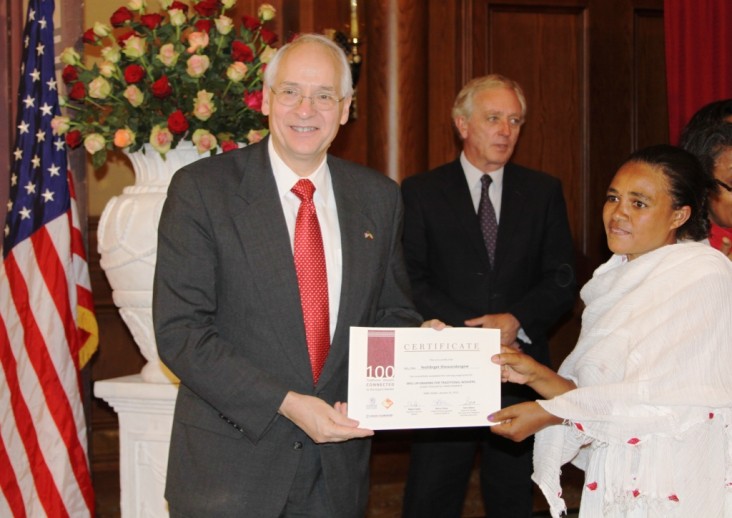
For Immediate Release
On February 7, 2013 the Center for African Women Economic Empowerment (CAWEE) celebrated the graduation of 100 traditional weavers now equipped with advanced skills in fabric design and production. All 50 of the first class of trainees found placement in export-focused companies, 90 percent of which are owned and managed by women. CAWEE expects similar placement for the next class of 50. By working for export companies, CAWEE estimates that traditional weavers can increase their income by as much as 75 percent.
Export companies are grateful for the program. “Getting trained and skilled weavers is instrumental for exporting companies to be able to continuously supply to the export market and meet demands of international buyers,” said Sara Abera, owner of SGDM and Muya Abyssinian Crafts. Ms. Abera also stated that “trained weavers contribute 95 percent to the growth of companies.”
Trainees were benefactors of the United States Agency for International Development (USAID) grant, “Connecting 100 Traditional Weavers to the Export Market.” The grant was jointly implemented by Sara Garment Designers and Manufacturers (SGDM), Muya Abyssinian Crafts, CAWEE and the USAID Competitiveness and Trade Expansion (COMPETE) program. The objective of the grant was to build on Ethiopia’s rich heritage of artisan/ handicraft skills to enhance the capacity of 100 traditional weavers to produce products for an export market.
From April to February 2012, CAWEE trainees learned production efficiency and effectiveness, developed new patterns and color combinations, and generally raised the quality and consistency of their products to meet the demands of the export market. Ms. Selamawit Teklu, a trainee from the first round stated: “The skills training I got to be a part of was life changing for me. Back home after the training, I got equipped to train my younger brother.”
In his remarks at the event, U.S. Ambassador Donald Booth stated, “With this women-led initiative, Ethiopian companies can meet the growing U.S. demand for high-quality, traditionally-made Ethiopian crafts. Everyone benefits – U.S. customers, Ethiopian business owners, and traditional weavers.”
USAID COMPETE supports worthwhile projects through its $20 million Partnership Fund (grants program). COMPETE also provides technical assistance to African firms and governments to enhance their competitiveness in global markets and help African businesses take advantage of trade opportunities available under the African Growth and Opportunity Act (AGOA). Since 2009, COMPETE has facilitated nearly $100 million in exports to the U.S. through AGOA and has assisted 200 firms to grow their export business and gain market access or expand in the U.S.
The CAWEE project site was established in Oromia Region, Alem Gena town, Sebeta on the outskirts of Addis Ababa, a location where many weavers settle after traveling from the Southern Region of Ethiopia. CAWEE hopes to replicate the USAID-supported weaver training course and continue to offer traditional Ethiopian crafts people access to the export market.
About Center for African Women Economic Empowerment (CAWEE)
CAWEE believes that “empowering women economically is key to development.” The Center provides diverse support services to women entrepreneurs. Since its establishment in 2004, 500 women-owned and managed companies have directly benefited from CAWEEE services, producing nearly 15,000 indirect beneficiaries. www.cawee-ethiopia.org
About Sara Garment Designers and Manufacturers (SGDM):
SGDM was established in 1981. It is a pioneer company focused on high-fashion products and Ethiopian textiles. Working on contemporary designs, the company reproduces ethnic/tribal hand woven collections with the ultimate purpose of targeting international markets. SGDM provided training for the project complete with modified hand looms and accessories.
About Muya Abyssinian Crafts:
Muya Abyssinian Crafts is a sister company of SGDM. Established in 2005, Muya Abyssinian Crafts focuses on high-end fashion accessories and soft-home furnishing products. Muya Abyssinian Crafts helped connect products from the trained weavers to the export market.
About USAID/COMPETE:
The USAID-funded Competitiveness and Trade Expansion (COMPETE) program is the East Africa Trade Hub. It is a regional program designed to enhance economic growth and food security in East and Central Africa. COMPETE works to improve the enabling environment for trade in East and Central Africa by harmonizing regional trade and transit policies and procedures, developing financial markets, providing support to private sector associations to strengthen value chains, and building the capacity of regional businesses to take advantage of preferential trading opportunities.
About AGOA:
Since 2000, the African Growth and Opportunity Act (AGOA) has provided incentives for African countries to become more globally competitive by making economic and commercial reforms. The main incentive is the opportunity to export goods, from a list of nearly 6,400 qualifying items, to the U.S. without paying import duties. This opportunity has the potential to significantly boost trade between Africa and the U.S. and to fuel innovation and job creation in Africa. To take advantage of the AGOA opportunity, African companies must improve their products and connect with U.S. buyers.
Press Release [PDF, 206 KB]







Comment
Make a general inquiry or suggest an improvement.